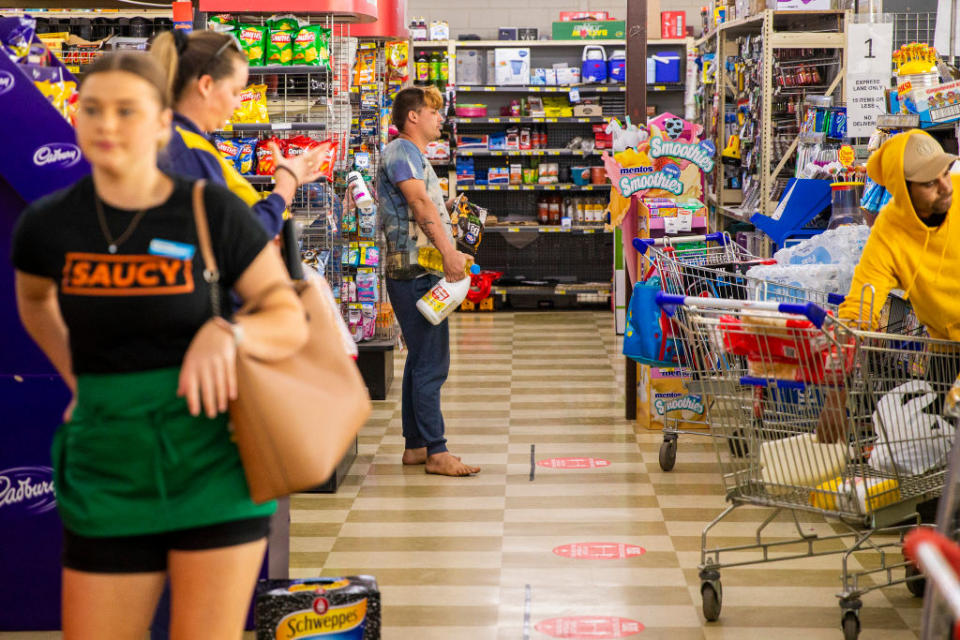Australia is heading towards deflation: What this means for you

If you caught the Reserve Bank of Australia governor Philip Lowe’s speech yesterday afternoon, there’s a small detail that might have caught your attention: “inflation will turn negative in June”.
Inflation is a general increase in the cost of goods and services, and also indicates a fall in the purchasing power of a nation’s currency.
Also read: Economic carnage will be felt for ‘next couple of years’: RBA
Also read: 1 in 5 Aussies could lose jobs in ‘worst economic downturn in history’
Also read: Coronavirus wreaks havoc on Aussie jobs, decimates industries
Australia’s inflation has been dipping below target for months, but it now looks like inflation is reversing altogether, even just for a period.
“In terms of inflation, we are also expecting a significant decline in the June quarter. The large fall in oil prices, combined with the introduction of free childcare and the deferral or reduction in some price increases mean that it is quite likely that year-ended headline inflation will turn negative in June,” Lowe said.
“If so, this would be the first time since the early 1960s that the price level has fallen over a full year. In underlying terms, however, inflation is expected to remain positive.”
But what is Lowe talking about? And what does this actually mean for consumers? Yahoo Finance asked the experts.
Breaking down Lowe’s comments
Inflation as measured by the consumer price index (CPI) will be negative in the year to the June quarter, said AMP Capital chief economist Shane Oliver.
This fall in the CPI will be driven by the drop in petrol prices, which have more than halved since January, he added.
“If [petrol prices are] excluded from the CPI, then prices will likely still have risen and this is what the governor means when he says that underlying inflation will likely remain positive.”
However, any price rises we’ll see will still be very low anyway, because Australia’s economy was already in a weak position before the twin crises of bushfires and Covid-19 hit.
“Price rises are generally likely to be very low, reflecting the fact that Australians have been forced to cut back their spending as a result of the shutdown and associated uncertainty around jobs and the economic outlook.”
And even then, we could see ‘underlying’ inflation turn into deflation anyway, Oliver said.
“There is some chance that even prices beyond petrol will fall, giving us a generalised deflation.”
Prices will go down
Deflation generally means that the overall prices of goods and services will drop.
“Deflation usually results from a dramatic rise in unemployment, and a collapse in incomes and aggregate demand,” Australia Institute Centre for Future Work chief economist Jim Stanford told Yahoo Finance.
With less money coming in, consumers defer their purchases (or await even lower prices down the track), causes the burden of debt to rise, and disrupts investment expectations and intentions.
“Deflation is typically associated with depression – and Australia already enters this downturn perilously close to it,” Stanford added.
Put simply, the cost of everything will go down.
“Prices fall. The price of a litre of petrol, a kilo of bananas, clothes or TV sets drops,” said independent economist Stephen Koukoulas.

Isn’t this a good thing for consumers?
The short answer is, not really: while price falls might seem like a good thing for the hip pocket, it’s a general sign that things are going badly.
“Sure, if you managed to keep your job and are making as much as you did before the pandemic, then it might seem like your dollar will go further,” said Stanford.
“But this is a sign of broader macroeconomic collapse that will ultimately be bad for everyone.”
According to Koukoulas, there are usually two reasons that prices might fall: firstly, that producers are so profitable that they’re able to reduce prices and still make a profit; or secondly, that prices drop because businesses are seeing less customers and need to lower prices to entice them to buy.
“It is clearly a bad thing as the economy is weak. It also means in this case profits are reduced, which bodes poorly for new business investment, additional hiring, and it is why it is a worry.”
What we’re generally seeing is the latter reason. “Lowe is saying that prices in general will fall in the near term as businesses discount their products as demand is lacking.
“Look at oil – with car usage down massively, airline flights down 70 per cent, oil demand has been in free-fall. Producers have not cut output so there is a glut – they cannot give oil away for nothing.
“That is a reflection of how bad things are.”
Oliver added that while the price of petrol had come down, motorists are driving less than normal anyway, meaning we aren’t reaping the full benefits.
“So while falling prices including for petrol – and hence deflation - are welcome the decline in jobs and incomes that it reflects is not.
“So on balance we would be better off if we moved back to small positive inflation and a return to normal incomes across the community.”

 Yahoo Finance
Yahoo Finance 

